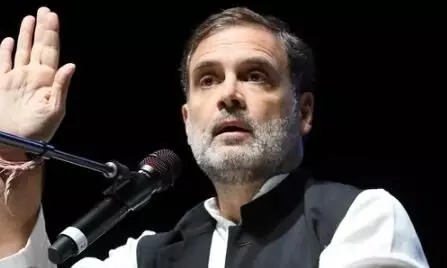India Tomorrow
NEW DELHI: During his ongoing visit to the United States, Congress leader and Leader of Opposition in Lok Sabha Rahul Gandhi made several notable remarks concerning India’s political and social landscape, particularly targeting the RSS (Rashtriya Swayamsevak Sangh) and Prime Minister Narendra Modi. He argued that the RSS fundamentally misunderstands India’s diverse nature.
Rahul Gandhi asserted that while the Congress party embraces India’s rich tapestry of languages, traditions, and histories, the RSS adheres to a more monolithic view. “Our belief,” he stated, “is that India is a union of states, as enshrined in our Constitution. It is a union of diverse languages, traditions, histories, music, and dance. The RSS, however, views India as embodying a singular idea and, in doing so, often devalues the unique contributions of various states and communities.”
He criticized the RSS for allegedly considering certain languages and cultures as inferior. Gandhi emphasized the importance of every Indian language and tradition, arguing that this inclusivity is crucial for a unified nation. “Imagine if someone told you that speaking Tamil, Marathi, Bengali, or Manipuri was unacceptable. This is the RSS’s ideology—imposing a hierarchy on our diverse cultures and languages. The fundamental issue is about the type of India we aspire to be: a country where every belief and tradition is respected, or one where a few decide what is permissible.”
Regarding Prime Minister Narendra Modi, Gandhi claimed that the fear surrounding Modi’s leadership has dissipated following the results of the 2024 Lok Sabha elections. “There has been a shift in public sentiment. People who once feared Modi now feel liberated from that fear,” he observed. He also suggested that Modi’s perceived invincibility has diminished, stating, “The myth of Mr. Modi’s grand persona is now history.”
Despite his criticisms, Rahul Gandhi emphasized that he does not harbour personal animosity toward Modi. “I don’t hate Mr. Modi. He holds a different viewpoint, and while I disagree with him, I have empathy for his position. It’s more productive to approach this with understanding rather than enmity.”
Gandhi further criticized the BJP’s approach, contrasting it with the Congress party’s message of inclusivity and love. “The BJP’s narrative suggests that one cannot be both an Indian and an American simultaneously. Our message is to foster love and humility, and to respect all identities and traditions. This is not just about political rhetoric; it’s about upholding values that promote harmony and mutual respect.”
He also addressed the role of the Indian diaspora in the United States, highlighting their potential as cultural bridges between the two nations. “You represent two great unions of states—India and the U.S.—and embody the respect and humility in which both can thrive. You have brought American values to India and Indian values to the U.S., enriching both societies.”
On the topic of employment, Gandhi drew comparisons between India and other nations, particularly China.
He said that while the West and India have employment problems, China and Vietnam don’t.
He said that “the US was the centre of production in the 1940s, 50s and 60s. Cars, washing machines, and TVs were all made in the US. Now the production shifted from the US to Korea and Japan. Now it went to China. China is dominating the global production. The West, America, Europe, and India gave up the idea of production and China took it over. Production creates job. Americans and Europeans focussed on consumption and hence, unemployment increased in these countries.”
In response, the BJP condemned Gandhi’s remarks, branding him a “black spot” on Indian democracy, signalling the intensity of political disagreement surrounding his statements.





